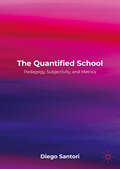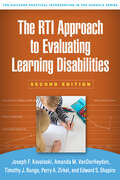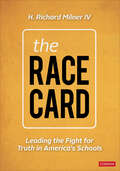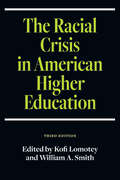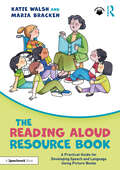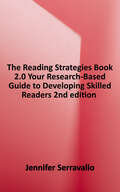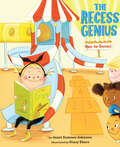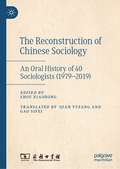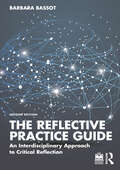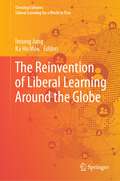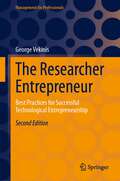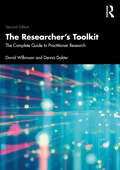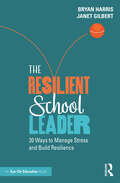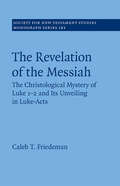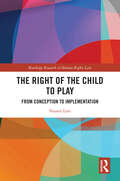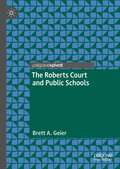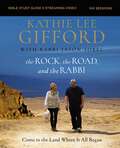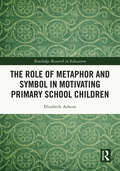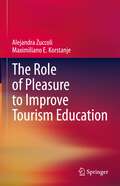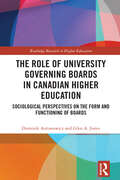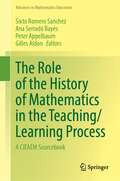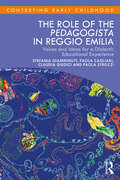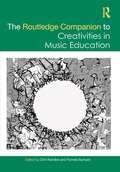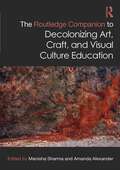- Table View
- List View
The Quantified School: Pedagogy, Subjectivity, and Metrics
by Diego SantoriThis book develops a theoretically rich analysis of quantification and subjectivity, tracing new linkages between educational policy and everyday life in schools, diving deeper into ‘ordinary’ schools as they encounter and navigate quantified forms of recognition. With a focus on Chile as a critical case of neoliberal experimentation, this book investigates whether intense exposure to quantified forms of meaning and sense-making in school settings could develop into metrics-driven dispositions or attachments. Contemporary demands on schools for calculation, prediction, and comparison by the use of accountability tools like high-stakes testing, league tables, consequential inspection ratings and ‘progress’ measures evidence the relentless presence of quantification in teaching and learning. This book argues the importance of bridging political, sociological and anthropological literatures together with affect and subjectivity theories to understand the complex ways in which standardisation, optimisation, automation, and surveillance crystallise into quantification-based forms of intelligibility.
The RTI Approach to Evaluating Learning Disabilities (The Guilford Practical Intervention in the Schools Series)
by Edward S. Shapiro Amanda M. VanDerHeyden Joseph F. Kovaleski Timothy J. Runge Perry A. ZirkelFrom leading authorities, this indispensable work is now in a revised and expanded second edition, presenting state-of-the-art tools and procedures for practitioners. The book shows how to use response to intervention (RTI) to evaluate K–12 students for specific learning disabilities (SLD). The second edition gives increased attention to optimizing the instructional environment in the context of a multi-tiered system of supports (MTSS). Procedures are described for screening at-risk students; using RTI to intensify instruction in reading, writing, and math; identifying SLD; determining eligibility for special education; and planning individualized education programs. Case examples and pointers for practice are woven throughout. In a convenient large-size format, the book includes reproducible tools that can be downloaded and printed for repeated use. New to This Edition *Incorporates contemporary perspectives on SLD, upgraded procedures for implementing an MTSS, new approaches to measuring RTI, and enhancements in using classroom observations. *Chapter on best practices in academic screening, including important dos and don'ts. *Separate chapters on using RTI for reading, written expression, and mathematics. *Chapter on RTI and special education law, focusing on what practitioners need to know. This book is in The Guilford Practical Intervention in the Schools Series, edited by Sandra M. Chafouleas.
The Race Card: Leading the Fight for Truth in America’s Schools
by H. Richard MilnerRace neutral leadership is not an option. Education leaders are on the frontline in the fight for racial justice and must co-construct practices to disrupt storylines, policies, and practices that perpetuate opportunity gaps. Drawing from established research and the wisdom of teachers, young people, parents, community members, policy advocates, and school leaders, The Race Card is a guide for frontline leaders at every level to confront and disrupt racism. Designed to engage leaders in candid conversations about race and racism, this book provides a road map for building anti-racist leadership capacity in today’s turbulent political environment. Features include Eight interrelated tenets of Frontline Leadership Strategies for supporting faculty, staff, students, and the broader community in practices centering racial justice and equity Guidance for dismantling the lies and beliefs that perpetuate inequities Design principles and strategies to cultivate opportunity-rich and robust curriculum, instruction, relationships, and assessment The frontline isn’t always a comfortable place, but it’s where education leaders are needed right now. Lead the fight for truth in your school community and help change history—by putting our nation back on the path to racial justice.
The Race Card: Leading the Fight for Truth in America’s Schools
by H. Richard MilnerRace neutral leadership is not an option. Education leaders are on the frontline in the fight for racial justice and must co-construct practices to disrupt storylines, policies, and practices that perpetuate opportunity gaps. Drawing from established research and the wisdom of teachers, young people, parents, community members, policy advocates, and school leaders, The Race Card is a guide for frontline leaders at every level to confront and disrupt racism. Designed to engage leaders in candid conversations about race and racism, this book provides a road map for building anti-racist leadership capacity in today’s turbulent political environment. Features include Eight interrelated tenets of Frontline Leadership Strategies for supporting faculty, staff, students, and the broader community in practices centering racial justice and equity Guidance for dismantling the lies and beliefs that perpetuate inequities Design principles and strategies to cultivate opportunity-rich and robust curriculum, instruction, relationships, and assessment The frontline isn’t always a comfortable place, but it’s where education leaders are needed right now. Lead the fight for truth in your school community and help change history—by putting our nation back on the path to racial justice.
The Racial Crisis in American Higher Education, Third Edition (SUNY series, Critical Race Studies in Education)
by Kofi Lomotey William A. SmithA crisis of immense magnitude persists in higher education in the United States. For this third edition of The Racial Crisis in American Higher Education, Kofi Lomotey and William A. Smith have gathered outstanding scholars in the field to address this dilemma on several levels. In thirteen original essays, contributors establish a framework for understanding the current crisis, provide historical perspective on the present, offer a stark overview of the day-to-day realities on campuses, and illustrate the role and impact of university leadership. With a foreword by Donald B. Pope-Davis and an afterword by Valerie Kinloch, as well as an introduction by the editors, the volume is provocative, up-to-date, and solution-driven, giving readers both a comprehensive analysis of the racial crisis in American higher education and ideas for addressing it.
The Reading Aloud Resource Book: A Practical Guide for Developing Speech and Language Using Picture Books
by Katie Walsh Maria BrackenThis practical guide is the ideal tool for the busy practitioner or speech and language therapist to provide an effective, meaningful, and contextualised approach to language development using picture books. Drawing from up-to-date, evidence-based research, each chapter shows you how to get the most out of picture books to support language development, with a focus on the range of opportunities that reading aloud can bring. The guide offers a complete package to promote speech, language, and early literacy, and to enrich language comprehension, vocabulary, phonological awareness, and oral language – all by using books to provide a context for meaningful language learning. The resource also includes advice on how to develop intervention goals and outcome measures for reading aloud, with practical suggestions covering topics from creating a reading routine and book nooks, to encouraging reluctant readers and reading aloud challenges. Language skills are essential for academic, social and communication success and this reading aloud resource will be valuable reading for early year educators, primary teachers, and speech and language therapists working with young children aged 0-7.
The Reading Strategies Book 2. 0: Your Research-Based Guide to Developing Skilled Readers
by Jennifer SerravalloEvidence-based, responsive instruction made easier. - 100 new and 200 heavily revised strategies - 700+ references or links to research studies - Skill progressions for progress monitoring - 200 new student-facing charts - New strategies for advanced middle school readers - Recently published mentor texts used in lesson examples Serravallo brings a practical and proven approach to helping teachers help kids develop as skilled readers. The Reading Strategies Book 2.0 is designed to work in every K-8 classroom, providing strategies and lesson plans for every type of reader. The user-friendly design of The Reading Strategies Book 2.0 makes it easy to find strategies, prompts, and tips that meet every student where they are now. Save prep time and support readers' progress toward skills mastery with classroom-ready features such as revised lesson language with updated mentor texts, teaching tips with advice for differentiation, and mostly new student-facing charts. Whether you are looking for powerful and engaging lessons for whole-class teaching, need to supplement your core curriculum with small-group instruction, want to improve the quality of content-area instruction, or need ideas for intervention, The Reading Strategies Book 2.0 will help you connect research to practice.
The Recess Genius 1: Open for Business (The Recess Genius)
by Janet Sumner JohnsonIntroducing the playground problem solver who uses quick thinking, practicality, tenacity, love of reading, and a little creative perspective to help her schoolmates out of their stickiest jams; From the author of Help Wanted: Must Love Books and the illustrator of Hello World!Regina Grey&’s never had much of a knack for anything, apart from disappearing into her books. She muddles her math, splutters her spelling, and gets jumbled up in gym.Until the day she off-handedly solves a classmate&’s brother troubles. Soon, rumor spreads across the playground of the pint-sized crisis manager who makes her office at the top of the jungle gym. She can solve any problem. Itchy cast? Here's a stick to get to the spot. Gum stuck in your hair? Snip, snip solved. It&’s like she&’s a genius—a recess genius.But all that problem solving for other kids doesn&’t leave much time for escaping in her books. Can the Recess Genius use her magical power to solve her own dilemma?
The Reconstruction of Chinese Sociology: An Oral History of 40 Sociologists (1979–2019)
by Zhou XiaohongTracing the evolution of Chinese Sociology from the late 1970s to the present day, the book aims to record the path of reconstruction, localization, change, and reform of Chinese Sociology through interviews with 40 Chinese top sociologists such as Su Guoxun, Zhou Xiaohong, Bian Yanjie, Zhao Dingxin, Zhou Xueguang et al. Divided into three sections, this insightful book is the best proof of the rapid development and overall improvement of the discipline since the reform and opening-up in China. On the occasion of the 40th anniversary of the restoration and reconstruction of Chinese Sociology, this book is expected to inspire the younger generation of sociology researchers and deepen public’s understanding of sociology.
The Reflective Practice Guide: An Interdisciplinary Approach to Critical Reflection
by Barbara BassotThe Reflective Practice Guide offers an accessible introduction to engaging effectively in critical reflection, supporting all students in their development of the knowledge and skills needed to enhance their professional practice. This second edition has been thoroughly updated with new chapters emphasising the importance of personal growth, processing emotions, building resilience, and issues of diversity, intersectionality and positionality. Throughout the book Barbara Bassot illustrates the process of critical reflection using examples and case studies drawn from a range of professional contexts, offering an interdisciplinary model of practice that may be applied to many settings. Drawing on literature from a range of disciplines, chapters explore the key aspects of reflection, including: Developing self-awareness The role of writing in reflection Reflecting with others The importance of emotions and processing feelings Managing change Learning from experiences Self-care and avoiding burnout The book is extended and enhanced through Instructor and Student Resources that include additional content including case studies, reflective activities, diagrams and videos. These can be found at www.routledge.com/cw/bassot. This essential text offers support, guidance and inspiration for all students in the helping professions including education, health, social care and counselling, who want to gain greater self-awareness, challenge assumptions and think about practice on a deeper level.
The Reinvention of Liberal Learning Around the Globe (Crossing Cultures: Liberal Learning for a World in Flux)
by Insung Jung Ka Ho MokDespite - or because - we live in calculative and instrumental times in higher education, liberal arts colleges and programmes are flourishing. They draw students fascinated by society and culture who want to make a creative contribution. The Reinvention of Liberal Learning around the Globe is an indispensable introduction to this diverse and brilliant educational world. (Simon Marginson, Professor of Higher Education; Director of ESRC/RE Centre for Global Higher Education, University of Oxford)The editors pull together a diverse set of authors to share a wide range of approaches and trends in shaping the present and future of our liberal arts institutions and programs. The diversity of perspectives makes this book of interest and use to anyone thinking deeply about and acting in support of the future of higher education and liberal arts education. (Michael McDonald, President, Great Lakes Colleges Association and the Global Liberal Arts Alliance)This book rigorously questions and redefines liberal arts education by examining unique contexts of Asia, North and South America, Europe, Africa, and the Middle East. It also considers the complexity of contemporary issues and emerging innovations in higher education. With the diversity of perspectives and experiences presented by the international authors, we could envision future liberal arts education in nurturing global and caring leaders with multiple collaborative possibilities through this book. (Mikiko Nishimura, Professor of International Christian University, Japan; Co-President of the Global Research Network for Liberal Arts Education)This volume comprehensively documents the transforming nature of liberal arts institutions within the overall tensions provided by the global pandemic occurring at the intersection with a major transitional moment of technology and communication. Its timeliness is underscored by the geographic reach of its contributions, providing a unique perspective on the multitude of ways in which higher education is responding to these powerful forces. (Deane E. Neubauer, Professor Emeritus of Political Science, University of Hawaii, Manoa; Associate Director of the Asia Pacific Higher Education Research Partnership)This is a most timely overview and analysis of liberal arts worldwide. The editors brought together thoughtful scholars from around the world to demonstrate the dogged persistence, resiliency, and vulnerability of the liberal arts. For those who still believe that the key value of higher learning is to enrich the intellect, enliven the spirit, and take more responsibility for the future of humanity, this valuable book provides a framework for the future. (Gerard A. Postiglione, Emeritus Professor, Honorary Professor of Education, The University of Hong KongChapter 3 is available open access under a Creative Commons Attribution 4.0 International License via link.springer.com.
The Researcher Entrepreneur: Best Practices for Successful Technological Entrepreneurship (Management for Professionals)
by George VekinisDiscover a transformative book that equips aspiring 'researcher entrepreneurs' with invaluable strategies to avoid common start-up mistakes. Unveiling a fresh perspective, it emphasizes that technological researchers already possess critical entrepreneurial traits, merely needing the right approach to succeed. From preparing and setting up a tech start-up to illuminating best practices, this book sets you on the path to triumphant technological entrepreneurship. This essential guide tackles the paradox of start-up failures, even after a very promising start, providing insights into how to overcome internal and external problems and obstacles and secure a thriving future. Tailored for researchers aiming to commercialize their technology by setting up a start-up and for technology transfer strategists supporting academic commercialization, the book ensures clarity by avoiding jargon and employing real-life case studies and exercises. Decision-assisting activities such as a "Commercialization Readiness Index (CRI)" and a "Market-prioritization Decision Matrix" offer valuable tools to help a researcher become a successful entrepreneur. Whether you're a seasoned researcher or an aspiring entrepreneur, this book will empower you to harness your potential, turning visionary ideas into flourishing businesses. Embrace the entrepreneurial journey and embark on a transformational ride towards success in the dynamic world of technological entrepreneurship.
The Researcher's Toolkit: The Complete Guide to Practitioner Research (Routledge Study Guides)
by David Wilkinson Dennis DokterDesigned for those undertaking research for the first time, this fully updated edition of The Researcher's Toolkit is a practical and accessible guide for all those partaking in small-scale research. Jargon-free and assuming no prior knowledge, it covers the entire research process, from defining a research topic or question through to its completion. This second edition has been fully revised by a collaborating team with a wealth of knowledge and practical experience in research project work. Including activity boxes to highlight key concepts and short summary boxes to indicate fundamental elements of various research areas, the chapters cover: The importance of research and framing your research question and research ethics Practical elements associated with planning and executing your research activity The application of survey-based research methods and the value provided by social media as data collection devices Deploying both quantitative and qualitative tools and techniques to analyse research data Writing up your research work and preparing it for wider access and consumption Examining the effect of your research work through assessing or measuring its impact The Researcher’s Toolkit is a must-read guide for students and budding researchers as well as educators seeking to explain academic research and writing to their pupils. It will benefit anyone looking to complete a research project whether inside academia or beyond.
The Resilient School Leader: 20 Ways to Manage Stress and Build Resilience
by Bryan Harris Janet GilbertLearn practical ways to manage the stress of being a school leader so you can get the most out of your career. In this follow up to the bestseller 17 Things Resilient Teachers Do (and Four Things They Hardly Ever Do), Bryan Harris and Janet Gilbert present strategies to help school leaders build resilience on a daily basis. Topics covered include focusing on purpose, prioritizing relationships, protecting your time, refining communication, being mindful and self-aware, recognizing and combatting burnout, taking risks, forgiving and apologizing, understanding change, and having fun. Each of the 20 short chapters presents a concise summary of the topic, a deeper look at what it means, and a list of practical applications that you can implement right away. With this guidebook, you’ll feel ready to bounce back from challenges and stay focused on the many rewards of leadership.
The Revelation of the Messiah: The Christological Mystery of Luke 1-2 and Its Unveiling in Luke-Acts (Society for New Testament Studies Monograph Series #181)
by Caleb FriedemanIn the first two chapters of Luke, characters acknowledge Jesus as Messiah, Son of God, and Lord. Lukan characters also speak of John going before the Lord God, suggesting that Jesus might be the Lord in view, and connect Jesus with Old Testament YHWH passages. These features have made Luke 1-2 a key locus for discussions of Lukan Christology, generating speculation as to whether Luke presents Jesus as divine. However, they also create an apparent incongruity with the body of the Gospel. In Luke 3 and elsewhere, human characters are initially ignorant that Jesus is Messiah, Son of God, and Lord. Moreover, Jesus' divinity – if Luke affirms it – does not seem to be recognized until after the resurrection. In this study, Caleb Friedeman advances a new model for understanding the Christological relationship between Luke 1-2 and the rest of Luke-Acts, in which Luke presents these opening chapters as a Christological mystery.
The Right of the Child to Play: From Conception to Implementation (Routledge Research in Human Rights Law)
by Naomi LottThis book provides a vital and original investigation into, and critique of, the situation facing the realisation of the child’s right to play. The right to play has been referred to as a forgotten right – forgotten by States implementing the Convention on the Rights of the Child, by the Committee on the Rights of the Child in monitoring and providing guidance on the Convention, and by human rights academics. Through multidisciplinary, original archival, novel doctrinal and primary empirical research, the work provides a thorough investigation of the right to play. It offers an innovative insight into its value, the challenges facing the realisation of the right, its raison d’être and its scope, content and obligations. It also critiques the Committee’s engagement with the right to play and shares lived experiences of efforts to support its implementation in the United Kingdom and Tanzania. The book highlights elements of best practice, challenges, and weaknesses, and makes recommendations for the continued and improved realisation of the right to play. The book will be a valuable resource for researchers, academics, advocates and policy-makers working in the areas of Children’s Rights, International Human Rights Law, Public International Law, Child Welfare, and Education.
The Roberts Court and Public Schools
by Brett A. GeierThis unique and timely book offers a synthesis, analysis, and evaluation of education-related rulings of the US Supreme Court from 2005 to the present. Throughout the course of the twentieth century into the twenty-first century, the Supreme Court issued rulings, which frequently vacillate based on the political composition of the justices who sit on the bench. Chapters will cover both an overview of the role of Supreme Court rulings in school policy and the court’s transformation in the late twentieth century into the present day. These themes will be converted into robust chapters which will provide a legal analysis of the Roberts Court years, and an evaluation of the jurisprudence and its practical effect on public schools.
The Rock, the Road, and the Rabbi Bible Study Guide plus Streaming Video, Updated Edition: Come to the Land Where It All Began
by Kathie Lee GiffordThis Bible Study Guide includes an access code to stream all six video teaching sessions.Begin your journey to a deeper faith by traveling to the land where the Bible was written.Kathie Lee Gifford and Rabbi Jason Sobel will take you and your group beyond the typical "Sunday school" teaching to examine the true texts of the Bible.In this six-session video Bible study (video streaming code included), Kathie Lee invites you to join her as she visits sites in Israel that have impacted her faith and understanding of Scripture. As she shares her story, coauthor Rabbi Jason—a messianic Jewish rabbi—provides fascinating background details that make the story of the New Testament come alive.As Kathie Lee and Rabbi Jason reveal in this study, Jesus (the Rock) came into this world and walked the lands of Israel (the Road) to show us the way to God. And when we are introduced to the mysteries of God&’s Word (the Rabbi) and understand it in the context in which it was written, radical transformation begins to renew our hearts and minds.Sessions and video run times:Bethlehem: Where It All Began (13:30)Nazareth: The Early Years (13:30)Capernaum: Ministry Headquarters (14:00)Galilee: Ministry Grounds (16:30)Mount of Olives: The Triumphal Entry (13:30)Jerusalem: Crucifixion and Resurrection (14:30) This study guide has everything you need for a full Bible study experience, including:The study guide itself—with discussion and reflection questions, video notes, and a leader's guide.An individual access code to stream all video sessions online. (You don&’t need to buy a DVD!)Streaming video access code included. Access code subject to expiration after 12/31/2028. Code may be redeemed only by the recipient of this package. Code may not be transferred or sold separately from this package. Internet connection required. Void where prohibited, taxed, or restricted by law. Additional offer details inside.
The Role of Metaphor and Symbol in Motivating Primary School Children (Routledge Research in Education)
by Elizabeth AshtonThis book provides a fresh approach to motivation in primary school children by exploring the role of metaphor and symbol in language and art as a means of expressing insights developed through learning. The book investigates and transcends Piaget’s dominant child developmental theories and considers alternative theories from psychiatry, not least ideas drawn from the theories of Jung and the works of McGilchrist. Using literary examples from primary school children’s work, including prose and poetry, religious narratives, and drama and art based on Jungian archetypal images, the book analyses how creative approaches to lesson planning around metaphor and symbol enable children to achieve higher levels of understanding than had been previously thought possible. Ultimately, the volume evaluates why current practice largely fails to retain the initial enthusiasm shown for learning by young children, and instead offers a wealth of possible new foundations and insights for learning among primary school children. Focusing the primary school curriculum on creative ability, this book will be of great interest to academics, researchers, and post-graduate students in the fields of educational psychology, primary school education and educational theory.
The Role of Pleasure to Improve Tourism Education
by Maximiliano E. Korstanje Alejandra ZuccoliThis book discusses how pleasure, as an emotional motivation, can play a leading role in improving the learning of new cognitive skills and abilities. Set in a research center orientated to innovate educative techniques for optimizing the learning process, this case study is focusing on the power of pleasure (joy) as a strategy to better the standard education systems in Argentina and beyond.This editorial project is based on an efficient experiment known as “PANCOE” where pre-graduate students of tourism bachelor at the University of Palermo, Argentina, were subject to different pleasurable experiences mainly marked by eating, tasting dishes and non-alcohol drinks while cooking and kneading bread pieces. PANCOE aims to integrate students' senses with their emotions, academic performance, and digital platforms. PANCOE devotes efforts to transforming negative feelings like fear into positive ones like joy. As an outcome, students who had taken part in PANCOE not only obtained higher degrees but also completed their studies with a bachelor's degree. Therefore, PANCOE situates as a promising and exciting tourism education method to better the academic performance of low-grade students in tourism and to bring creativity to the tourism classroom for all students.
The Role of University Governing Boards in Canadian Higher Education: Sociological Perspectives on the Form and Functioning of Boards (Routledge Research in Higher Education)
by Glen A. Jones Dominik AntonowiczThis book explores the historical and social foundations of Canadian higher education and provides a detailed analysis of university boards within this broader context of university governance. By examining rich empirical data from a sociological perspective, it offers unique insights into the role of boards, and the structures and practices that frame their work. It explores board composition, the professional backgrounds of board members, how members perceive their role, and the complex relationships between the board and the university president. The authors also compare and contrast the Canadian experience with governance reforms in Europe and other regions over recent decades. Drawing on multiple theoretical perspectives, the authors provide a nuanced analysis of the role of boards in terms of oversight, protecting university autonomy, representing societal interests, and dealing with increasing complexity and expectations. This innovative, original study makes an enormous contribution to our understanding of the role and work of Canadian university boards, and to international scholarship on higher education governance. It will appeal to scholars and researchers with interests across higher education, international and comparative education, and the sociology of education.
The Role of the History of Mathematics in the Teaching/Learning Process: A CIEAEM Sourcebook (Advances in Mathematics Education)
by Gilles Aldon Peter Appelbaum Sixto Romero Sanchez Ana Serradó BayésThis volume presents multiple perspectives on the uses of the history of mathematics for teaching and learning, including the value of historical topics in challenging mathematics tasks, for provoking teachers’ reflection on the nature of mathematics, curriculum development questions that mirror earlier pedagogical choices in the history of mathematics education, and the history of technological innovations in the teaching and learning of mathematics. An ethnomathematical perspective on the history of mathematics challenges readers to appreciate the role of mathematics in perpetuating consequences of colonialism. Histories of the textbook and its uses offer interesting insights into how technology has changed the fundamental role of curriculum materials and classroom pedagogies. History is explored as a source for the training of teachers, for good puzzles and problems, and for a broad understanding of mathematics education policy. Third in a series of sourcebooks from the International Commission for the Study and Improvement of Mathematics Teaching, this collection of cutting-edge research, stories from the field, and policy implications is a contemporary and global perspective on current possibilities for the history of mathematics for mathematics education. This latest volume integrates discussions regarding history of mathematics, history of mathematics education and history of technology for education that have taken place at the Commission's recent annual conferences.
The Role of the Pedagogista in Reggio Emilia: Voices and Ideas for a Dialectic Educational Experience (Contesting Early Childhood)
by Paola Cagliari Claudia Giudici Stefania Giamminuti Paola StrozziThe Role of the Pedagogista in Reggio Emilia offers unparalleled insight into dialectic encounters between teachers, pedagogistas, and atelieristas in the world-renowned municipal early childhood services of the city of Reggio Emilia. It sheds light on the system and culture that cares for and sustains an enduring educational experience, for the common good. Emerging from a collaborative research project with Reggio Children and the Preschools and Infant-toddler Centres – Istituzione of the Municipality of Reggio Emilia, this book features in-depth observations of pedagogistas, teachers, and atelieristas, as well as interviews with key figures in Reggio Emilia. Children’s learning is thoughtfully emphasised, as the authors render the inextricable connection between theory-practice-research, framing documentation and progettazione as artful collective experimentation. The authors illuminate how Reggio Emilia’s system sustains reciprocal professional formation through progettazione, contesting dominant marketplace discourses of early childhood education as a commodity and re-imagining settings driven by values of reciprocity, artistry, culture, and the common good. By troubling conventional views on education and care, professionalism of teachers, and educational leadership, this book will appeal to all those who long for something different and hope to shift the field of possibility for early childhood education culturally, socially, pedagogically, and politically. It will be a key resource for teachers, leaders, policy makers, and scholars in the whole field of education.
The Routledge Companion to Creativities in Music Education (Routledge Music Companions)
by Clint Randles, Pamela BurnardViewing the plurality of creativity in music as being of paramount importance to the field of music education, The Routledge Companion to Creativities in Music Education provides a wide-ranging survey of practice and research perspectives. Bringing together philosophical and applied foundations, this volume draws together an array of international contributors, including leading and emerging scholars, to illuminate the multiple forms creativity can take in the music classroom, and how new insights from research can inform pedagogical approaches. In over 50 chapters, it addresses theory, practice, research, change initiatives, community, and broadening perspectives. A vital resource for music education researchers, practitioners, and students, this volume helps advance the discourse on creativities in music education.
The Routledge Companion to Decolonizing Art, Craft, and Visual Culture Education (Routledge Art History and Visual Studies Companions)
by Amanda Alexander Manisha SharmaThis companion demonstrates how art, craft, and visual culture education activate social imagination and action that is equity- and justice-driven. Specifically, this book provides arts-engaged, intersectional understandings of decolonization in the contemporary art world that cross disciplinary lines. Visual and traditional essays in this book combine current scholarship with pragmatic strategies and insights grounded in the reality of socio-cultural, political, and economic communities across the globe. Across three sections (creative shorts, enacted encounters, and ruminative research), a diverse group of authors address themes of histories, space and land, mind and body, and the digital realm. Chapters highlight and illustrate how artists, educators, and researchers grapple with decolonial methods, theories, and strategies—in research, artmaking, and pedagogical practice. Each chapter includes discursive questions and resources for further engagement with the topics at hand. The book is targeted towards scholars and practitioners of art education, studio art, and art history, K-12 art teachers, as well as artist educators and teaching artists in museums and communities.
